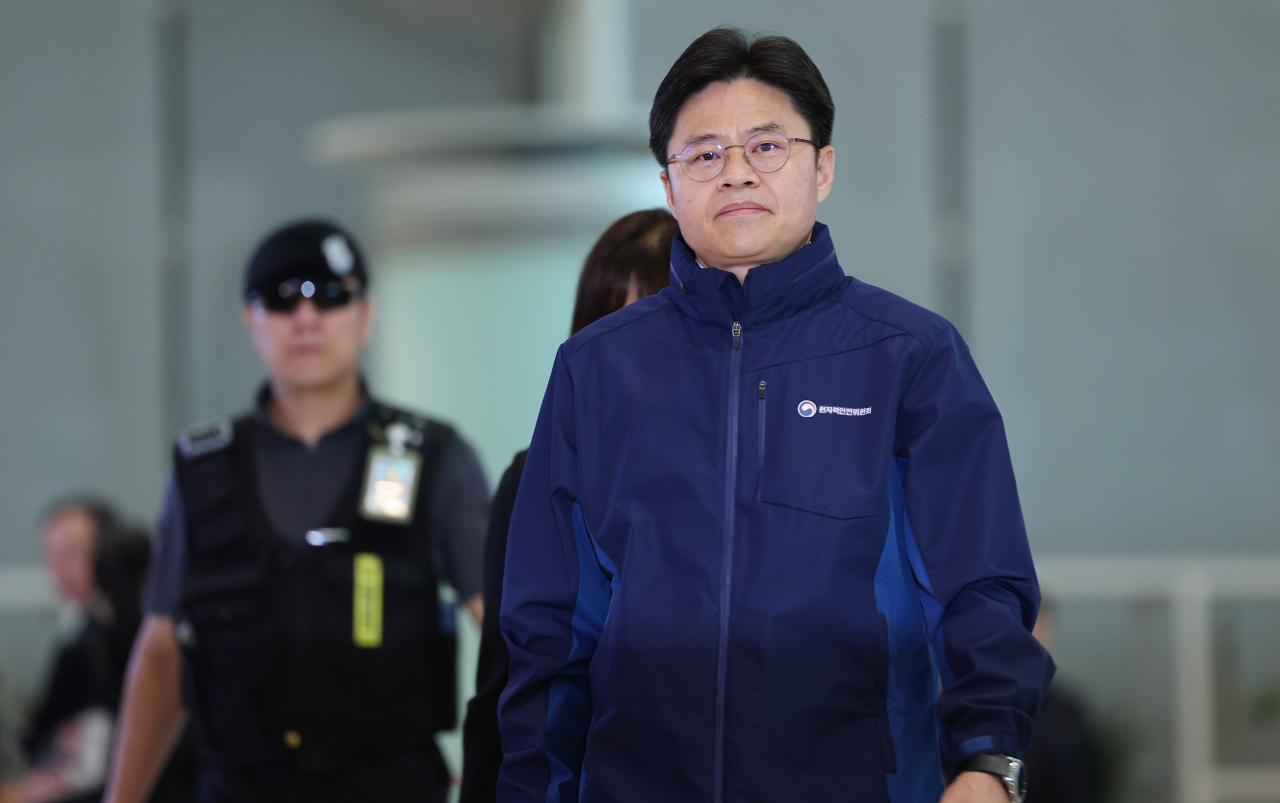
A 21-member Fukushima Daiichi wastewater inspection team departed from Incheon Airport Sunday morning for a six-day trip to Japan to deliver Seoul's own assessment of the wastewater treatment facilities in the quake-hit region before Japan's planned discharge of the water starting as early as this year.
The inspection team reiterated that it would affirm the safety of the facilities in Japan based on "scientific grounds and standards." This came amid persistent local backlash from neighboring countries including Korea that the release of radioactive water will end up affecting marine life and those who consume marine products in neighboring countries.
"It is the inspection team's responsibility to assure Korean citizens (of our inspection results)," the inspection team’s leader Yoo Guk-hee told reporters before departing for Japan.
"I expect citizens to be convinced about the safety of the water discharge process if we monitor the site thoroughly with a scientific approach, and explain to the Korean people what else needs to be confirmed further," Yoo said.
Yoo chairs the Nuclear Safety and Security Commission under the Office for Government Policy Coordination, which began assessing the impact of Japan's wastewater disposal on the country in August 2021.
The inspection team is comprised of experts from state-run institutions such as the Korea Institute of Nuclear Safety and the Korea Institute of Ocean Science and Technology. Other than Yoo, the identities of the team members remain under wraps. Last week, Bang Moon-kyu, minister of the Office for Government Policy Coordination, ruled out the participation of private-sector experts on the inspection team to prevent representativeness bias.
Every expert on the team has at least 10 years of experience in the fields of nuclear safety regulation, according to Yoo.
The team's six-day trip to Fukushima is aimed to verify whether the water that Japan claims is being processed through an advanced Liquid Processing System steers clear of radioactive elements.
On Monday, the inspection team will hold talks with representatives Tokyo Electric Power Co., the operator of the Fukushima Daiichi power plant, to confirm the inspection team's checklist.
The inspection trip to the nuclear plant will take place on Tuesday and Wednesday. Tuesday's visit to the plant mainly revolves around the multinuclide removal facilities and water storage facilities there to see if they are operation as per Japan’s claims. On Wednesday, the team will also review the methodology of Japan's speciation analysis and radionuclide analysis procedures.
Japan has claimed that most of the radioactive elements have been filtered out from the treated water slated for release, with the quantity of such elements lower than the international safety standard except for two forms of nuclides called tritium and carbon-14. Japan claims that the quantities of the two in the water are at a level that is unlikely to harm human health.
Thursday's meeting of the inspection team and its Japanese counterpart will allow Korean inspectors to ask for additional clarifications on the water treatment procedures.
Yoo said the inspection result will be open to the public, but did not confirm when the briefing would take place.
The inspection team's own assessment is separate from that of the United Nations’ International Atomic Energy Agency, whose task force is to announce the final assessment result in June.
The IAEA task force will handle the sampling of the wastewater to measure its safety, unlike Korea's inspection team, which will not conduct sampling of the water. The IAEA task force includes a Korean expert, so that Korea has a say about the quality of the wastewater.
Upon the IAEA's approval, Japan is set to discharge about 1.3 million metric tons of what it claims to be "treated" water that was contaminated with radioactive elements following a massive earthquake and tsunami in 2011 which destroyed the Fukushima Daiichi plant's cooling systems and caused three reactors to melt and release large amounts of radiation.





![[Graphic News] More Koreans say they plan long-distance trips this year](http://res.heraldm.com/phpwas/restmb_idxmake.php?idx=645&simg=/content/image/2024/04/17/20240417050828_0.gif&u=)